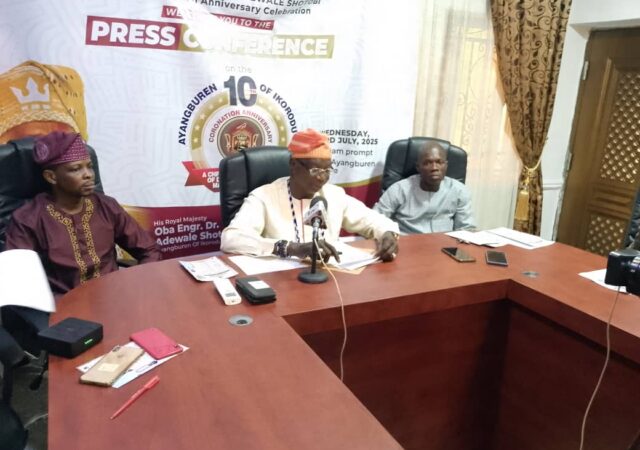- Identifies increased investment in local oil and gas production, strategic reserves storage, energy mix and artificial intelligence as viable pathways.
Rising from the 3rd edition of the recently held PENGASSAN Energy and Labour Summit (PEALS 2024), senior staff in the Nigerian petroleum and natural gas sector have strongly advocated for an increased focus on energy security whilst x-raying the industry’s challenges and opportunities.
This was communicated at a press briefing held earlier today where executives of PENGASSAN presented the communique of the summit to the media.
According to the organizers of “PEALS 2024” there were comprehensive discussions that highlighted the current state of Nigeria’s oil and gas sector.
Participants examined key areas for optimization across exploration, drilling, production, refining, transportation, and distribution.
A significant focus was placed on enhancing energy security, affordability, and accessibility, as Nigeria navigates a global push for sustainable energy solutions.
One crucial area of discussion was Nigeria’s energy mix. As the world shifts toward greener alternatives such as solar, wind, and hydrogen, the summit emphasized the need for Nigeria to embrace these changes while leveraging its hydrocarbon resources. Artificial Intelligence (AI) emerged as a game-changer, with potential to increase operational efficiency, enhance productivity, and boost investor confidence. However, participants recognized that upskilling and reskilling the workforce would be essential for this transformation.
The summit also underscored the importance of natural gas as Nigeria’s transition fuel, framing this decade as pivotal for gas development. The Nigerian Gas Master Plan was scrutinized, examining both its successes and the challenges that lie ahead.
National President of PENGASSAN, Comrade Festus Osifo, during the presentation, called on the Federal Government to urgently fix the four national refineries and divest the majority share to the private sector.
He said the refineries should be modeled after the Nigerian Liquefied Natural Gas (NLNG) model, which appears to have been successful.
“Ramping up efforts to make the nation’s four refineries work; once operational, the government should divest majority shareholdings and own at most 49% of the shareholding in the four refineries. Core investors will be brought in to take the 51% as applicable in NLNG”.
Osifo also stated that the NNPC Limited (NNPCL) should strive to increase it stake in the Dangote Refinery to 45percent, thereby ensuring therebwouod be more equitable distribution of petroleum products across the country.
Highlighted as one of the most pressing concerns was the rampant issue of crude oil theft, which poses an existential threat to the industry. To ensure the sector’s viability, the summit called for urgent action to combat this menace.
There were major recommendations made, including:
i. Strengthening the Value Chain: The summit urged the Federal Government to enhance the oil and gas value chain for a more efficient downstream distribution system. Reliance on inadequate truck-based logistics must be addressed to prevent recurring fuel shortages.
ii. Attracting Investment: The government should provide incentives to attract both International Oil Companies (IOCs) and indigenous producers. A proposed allocation of 50% of accruable revenue to renewable energy investments was suggested, aligning Nigeria’s strategies with global trends in greener energy.
iii. Energy Mix Policy: A clear and implementable energy mix policy is critical. This framework would guide negotiations with stakeholders interested in diversifying energy sources in Nigeria.
iv. Combating Crude Oil Theft with Technology: The summit recommended employing advanced technologies, including AI-powered surveillance, drones, and predictive analytics, to detect and report theft in real-time. A multifaceted control room should be established for rapid response.
v. Re-engineering Security: The Federal Government must enhance its security architecture, taking over the responsibility of securing oil and gas installations. This shift would significantly lower production costs and improve safety.
vi. Legal Repercussions: Severe legal action against those convicted of crude oil theft was emphasized as a necessary deterrent.
vii. Divestment Framework: A comprehensive framework under the Petroleum Industry Act (PIA) should guide asset divestment, ensuring that workers are protected from job losses during transitions.
viii. Embracing AI: Strategies for implementing generative AI within the energy sector should focus on enhancing every element of the supply chain, improving quality of life, and meeting societal needs.
ix. Overcoming Implementation Challenges: Stakeholders must address obstacles to AI adoption, including competing priorities and gaps in training and infrastructure.
Collaborative Efforts for a Sustainable Future
The summit concluded with a call for unity among stakeholders, including PENGASSAN and sister unions.
Strengthening regulatory frameworks and enforcement mechanisms is essential to tackle the multifaceted challenges confronting the industry. Achieving these goals will require collective innovation, information sharing, and a robust commitment to safeguarding Nigeria’s resources.
As Nigeria looks to the future of its oil and gas industry, the insights and recommendations from PEALS 2024 provide a roadmap for navigating the complex landscape ahead, ensuring a resilient and sustainable energy sector for generations to come.
Held in Abuja, the summit with the theme “The Future of Nigeria’s Oil and Gas Industry: Energy Mix, Energy Security, Artificial Intelligence, Divestments and Crude Oil Theft”, played host to a top cast of diverse stakeholders in the sector.







